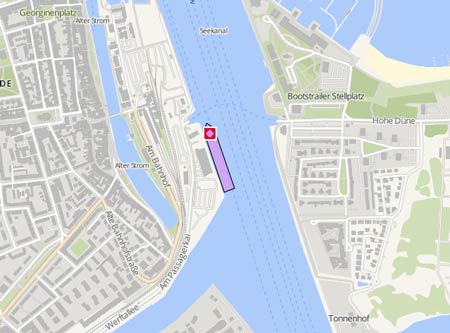PACIFIC ERA
Latest ports
Latest Waypoints
Latest news
Manager pleaded guilty to criminal MARPOL violations in connection to oily-waste discharges
A Greek ship manager has pleaded guilty to criminal MARPOL violations in connection to oily-waste discharges aboard the 'Galissas'. The owner also admitted to sailing the tanker across the Atlantic and U.S. waters without notifying the Coast Guard that the inert-gas system was broken, creating a hazardous condition on board. On Feb 2, 2022, when the tanker was getting ready to leave Rotterdam, the crew discovered that the inert gas system was not working. Rather than wait for a spare part to fix it, the ship's master and shipmanager Zeus Lines Management decided to sail the ship to the U.S. and get the part on arrival in Newport, Rhode Island, even though there could be unsafe levels of oxygen in the cargo tanks during the transit. The master knowingly failed to report this hazardous condition to the Coast Guard on pre-arrival paperwork and at the time of the arrival in Newport. The crew received and installed the spare part they needed as soon as they arrived in the U.S., but the system remained broken after they installed it. On Feb 20, the day after the arrival, the U.S. Coast Guard boarded the 'Galissas' and began an inspection. The captain told them that the inert-gas system did not work, and the inspectors took measurements of the oxygen percentage in the vessel's cargo tanks. The oxygen level measured 15-17 percent, well in excess of the maximum safe level of 8 percent. Given the possible fire or explosion hazard created by this condition, the Coast Guard ordered the tanker to relocate to an anchorage further offshore, where the vessel would not pose a risk to life and property. The master consulted with Zeus' operations manager about the situation, and the manager instructed him to fabricate a logbook that showed regular readings of the tank's oxygen levels during the voyage. This fake log was designed to show that the oxygen level had been safe at the time of departure and throughout most of the vessel's transit. In reality, the crew had taken no readings of the kind. The task of making up this logbook fell to the chief mate, who took care of it, and the log was presented to the Coast Guard. Meanwhile, as the marine inspectors continued their examination of the ship, they found more than two dozen deficiencies. The garbage record book, load line certificate and fire drill records were missing, life boat launching arrangements were inoperable, and there were problems with the steering gear, electrical systems, winches, potable water system, and oil water separator. In the course of the inspection, they discovered that the chief engineer's oil record book log entries did not line up fully with the electronic records on the oil-water separator. The Coast Guard interviewed the chief engineer, who claimed that the ship's oily waste had been properly discharged to shore reception facilities - a costly compliance service that increases overhead for the vessel operator. However, the Coast Guard determined that his claim was not accurate. Instead, the chief engineer had ordered lower-ranking crewmembers to discharge untreated oily bilge water into the sea on three separate occasions, releasing a total of 9,500 gallons of oily waste into the marine environment. None of these discharges were recorded in the oil record book. To conceal this practice from the U.S. Coast Guard - the agency with the world's most stringent reputation for MARPOL prosecutions - the chief engineer repeatedly ordered his subordinates to lie about where the oily waste had gone. The Zeus Shipmanagement has agreed to plead guilty to one count of failing to maintain an accurate oil record book and one count of failing to immediately report a hazardous condition. The firm agreed with prosecutors to recommend a fine of $2.25 million and four years of probation. The chief engineer, Roberto Cayabyab Penaflor, has pleaded guilty to one count of violating MARPOL. The maximum possible sentence is six years' imprisonment and a fine of up to $250,000. The captain, Jose Ervin Mahigne Porquez, has pleaded guilty to one count of failing to immediately report a hazardous condition. The maximum possible sentence is the same - six years' imprisonment and a fine of up to $250,000.
New charter fixed
$14,000, for 3 months trading, to BW MARITIME
Owners declared general average after engine trouble
The "Galissas", laden with a cargo of gasoil on a voyage from Ar Ruways in the United Arab Emirates to Brazil, deviated to Cape Town due to main engine problems on June 11, 2018. Inspections were subsequently conducted on board and sea trials were undertaken with unsatisfactory results resulting in the vessel berthing at the JAckson Wharf in Cape Town again on July 4. The owners have declared GA and that further inspections were being conducted on the main engine in order to ascertain the cause of the problems. The possibility of cargo transhipment has not been reported although this cannot be ruled out depending on further investigations of the main engine problems.
Upload News

